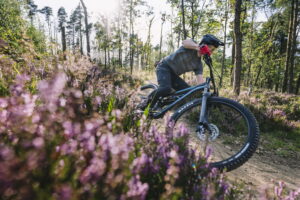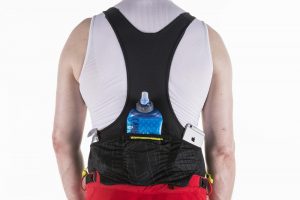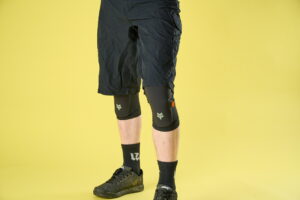The Intense Tracer 279 demands your attention. Not because of its sleek carbon frame, MX wheel format, or even its enduro-ready coil-sprung shock. No, it’s the unique ride quality that makes this 170mm travel enduro bike stand up and deserve to be counted.
Riding the Intense Tracer 279 Pro made me feel 20 years younger
First, I want to get some facts on the ground. At 16.33kg the Intense Tracer 279 Pro is a ballpark weight for one of the best modern enduro bikes with a coil shock and Maxxis EXO+ casing tyres. And for some perspective here, the Yeti SB160 T1, which is £3k more expensive, is only slightly lighter at 15.91kg.

Forget straight lines, the Tracer 279 loves getting sideways
With an air shock and some carbon components fitted, the Tracer could easily sneak below the 16kg threshold and start encroaching on trail bike territory – giving bikes like the Specialized Stumpy Evo Elite Alloy that I tested recently a real run for its money.
Intense Tracer 279 – Need to know
- Carbon enduro frame designed around MX wheels
- JS Tuned enduro link provides 170mm travel
- Fox Performance Elite suspension, with plush DHX2 coil shock
- The Fox 38 Performance Elite fork matches travel at 170mm
- Shimano XT gears and 4-piston brakes
- SRAM UDH, so T-Type drivetrain compatible
- CHAD integrated down tube storage, includes tube bag
- Boost quick release axles front and rear
But even in stock trim, the Tracer 279 Pro rides light and feels remarkably agile. So much so, that I had to double check on the Intense website just to see which category it had been shoehorned into. Enduro it is, then. In fact, the ride quality reminded me of the Trek Slash 9.8 XT Gen 5, which was also extremely versatile for an enduro race bike.

MX/Mullet: 29in up front, 27.5in out back
Suspension travel and geometry
And the numbers certainly reflect Intense’s intent. Travel on the rear is a whopping 170mm, which is matched precisely up front with the 4-way adjustable Fox 38 Performance Elite fork. The geometry is on point too, the frame delivering a slack 64º head angle, generous 478mm reach in size L and a 343mm BB height in the high geometry setting. Simply flip the adjustable chip in the shock eyelet to slacken and lower the bike further.

The Fox DHX2 coil shock is smooth as butter
Ride height adjustment
I say simply. Because the high/low flip chip in the rear shock mount is obscured by the uprights of the triangulated carbon swingarm, so dropping the shock out of the trunnion mounts in the front triangle is the easiest way to get at it.

Flip chip, hidden behind the Intense Tracer 279’s carbon swingarm
And in addition to using the flip chip as a straight up geometry adjuster, it also gives you the option to run a firmer spring in the low setting or a softer spring in the high setting, retaining the same dynamic geometry, but with slightly different suspension responses. Handy, given that the standard Fox springs come in 50lb jumps, and don’t offer the same degree of adjustability as an air-sprung shock.
MX wheels for party laps
Nothing out of the ordinary for an enduro bike then, and the dimensions are nigh on identical to the Tracer 29 in all but one key metric: chainstay length. On the 29er it’s a stable 450mm, while the Tracer 279 is 13mm shorter at 437mm. Now, 437mm isn’t crazy short for an MX wheel bike, and there are plenty of full 29ers that have the same chainstay measurement. Still, there’s something about the Intense Tracer 279 that rides different, and it was apparent from the get go.

Back to back: Intense Tracer 279 Vs Intense Tracer 29
Why else would I have decided, completely out of the blue, to 180 out of a bomb hole that I must have ridden straight through thousands of times in the past? I was even more surprised when I actually landed it, given that I haven’t attempted a 180 or a 360 in well over a decade.
Key design highlights
But enough about my jibbing antics. Let’s get back on track. Being an enduro race bike, the Tracer has quick release axles front and rear. Because if you’re against the clock, you need rapid puncture repairs. Best of all, the lever on the rear axle pulls out just like the one on the Canyon Spectral.

The QR lever is tucked neatly into the rear axle
Flipping the bike over to fix a flat also reveals the CHAD storage hatch in the underside of the down tube. The opening is only 65x120mm, considerably smaller than Specialized’s SWAT which is 50x160mm on the carbon Stumpy Evo that won our Trail Bike of the Year test. Still, combined with the inner tube pouch there’s actually quite a lot of space under the hatch, for adding a multi-tool and an ultralight jacket.

Meet CHAD, the integrate down tube storage solution
With the bike upside down you’ll also notice the BB-centric lower link of the JS Tuned suspension. Grease ports on the link keep the pivots all moving freely and with the shock removed, there’s no detectable stiction within the linkage system. Yes, the lower link protrudes well below the BB shell, so it’s a good thing that the e*Thirteen chain guide has a skid plate mounted to the ISCG 05 tabs to protect it from rock strikes.

Slack head angle and stubby stem for complete control
A bike from the future?
My prediction for 2024 and beyond is that we’re going to see more mudguards on bikes, so Intense is already ahead of the curve. The neat removable rear mudguard on the Tracer 279 shields the shock and the back of the seat tube from crud flying up from the rear tyre.

The Intense Tracer 279 has a neat rear mudguard
A couple of final touches that I really liked were the textured remote lever on the Vario post, where the action of the e*Thirteen post itself was really smooth and had a nice light lever action. Also the Intense grips are the money.
Performance
Now, it’s not lost on me that enduro bikes are NOT designed for jibbing. So if you want to go as fast as humanly possible from A to B, then the Tracer 29 would be my first choice here. Unless, of course, I was at the races simply to do tricks, look good for the camera and bag some media coverage. We even have the stats to prove it, our Mullet Vs 29er video clearly putting the Tracer 29 ahead of the 279 both up hill and down.

The difference in ride quality is black and white: Tracer 279 Vs Tracer 29
But how many riders buy an enduro bike to go racing? Not that many, and those that do race are probably on a shop deal or sponsored in some capacity. So who is the Tracer 279 for? It’s for anyone that wants a fun bike to do everything on.
How it climbs
Unless you’re lucky enough to live near a ski resort or uplift, then enduro bikes need to climb efficiently. And the Tracer 279 delivers. With the generous reach and steep 77.6º seat tube angle the Tracer 279 puts the rider in a good position for winching up the steepest gradients. Yes, when it gets really steep, you do need to bump yourself a little further forward on the saddle than on bike with longer chainstays, but with the climb switch engaged on the Fox DHX2 shock, it never feels like the 170mm suspension is absorbing energy that could be put to better use overcoming the pull of gravity.

TheIntense Tracer 279 isn’t as fast as its big wheel sibling, but it’s more fun
On the descents
The distinct lack of seal friction in the coil-sprung shock that makes the climb switch necessary, also affords the Intense an amazingly responsive ride. Traction and comfort on the roughest trails are both next level. But there’s a price to be paid for such a free-flowing suspension response. And that’s a slight loss of stability.

Steep and deep is where the Intense Tracer 279 shines
As such, I found myself constantly adjusting my riding position to keep the weight distribution evenly balanced between the contact patches of the tyres. And while these micro adjustments in body position were small, over the course of a couple of days’ practice and racing they will add up, placing unique demands on your mental and physical energy levels.

Forget popping the front up, it’s almost impossible to keep it down
Where the MX format on the Tracer 279 makes the most sense then, is when riding with the seat of your pants approaching the rear tyre. So whether that’s drifting the rear wheel down a steep loamer, or getting really far off the back of the bike to squash a drop, the Tracer lets you move around the bike without inhibition. The freedom of movement is further enhanced by the low slung top tube and smooth tubing profiles, which allow the bike to feel integrated and organic, rather than a separate entity.
Verdict
As an out-and-out enduro race bike I think the Tracer 279 is flawed. Sure, if you’re under 5ft 9in tall and you’re on the size S or M then the tables will be tuned as the shorter chainstay and smaller rear wheel will be a massive boon. For taller riders looking to go flat out on blind terrain though, the Tracer 279 is too distracting. It will have you looking off to the side of the trail for bonus hits, doing fast plants and rollouts when your only focus should be maintaining forward momentum and getting to the finish line as fast as possible. Now, I’m not saying you couldn't race the Tracer 279 to success, I’m just convinced that it’s real calling is mucking about in the woods with your mates. As the bike test editor at MBR I get to ride a lot of different bikes, and few, if any, have had me fooling around as much as the Tracer 279. Okay, so it’s not the Elixir of youth, but any bike that makes you ride like a kid again has got to be a good thing, right?















